Search the Special Collections and Archives Portal
Search Results
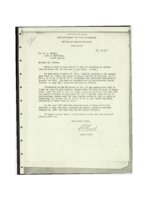
Land purchased for the Las Vegas Paiute Tribe: correspondence
Date
Archival Collection
Description
Letter from Chief Clerk Hauke to Superintendent E. A. Farrow detailing the precise geographic location of the Las Vegas Paiute Colony and informing of a 1920-01-19 survey of the area.
Text
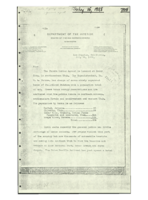
Paiute Indian Agency report, 1928
Date
Archival Collection
Description
Report from Mary Vaux Walcott to Chairman Samuel A. Eliot. Endorsed by Eliot and transferred to Secretary Malcolm McDowell. Increased tourism in the Arizona, Nevada, and Utah region, and lack of knowledge and understanding of Paiute culture. Report on the seven separate and distinct bands of Paiute: Kaibab, Arizona (93); Shivwits, Utah (80); Cedar City, Goshute, Indian Peake Panguitch and scattered, Utah (314); and Moapa River, Nevada (192) totaling 679 Paiute in the region. The report details the general situations (land, health, and economic) in different geographic locations.
Text
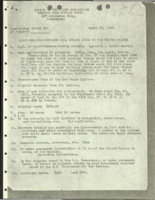
Federal questionnaire about the Las Vegas Paiute Colony
Date
Archival Collection
Description
Office of the Chief Coordinator, Federal Real Estate Board, Questionnaire Covering Real Estate Owned by the United States, completed by E. A. Farrow, detailing the establishment and status of the Las Vegas Paiute Colony.
Text
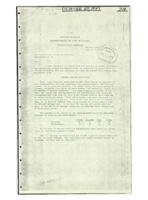
Paiute Agency health conditions report
Date
Archival Collection
Description
United States Department of the Interior Indian Field Service report and recommendations by Supervisor of Indian Education Carl M. Moore documenting conditions, including trachoma and tuberculosis cases, at Kaibab Day School; Shivwits Day School; Konosh and Korshorem; Skull Valley; Goshute Day School; Public Schools at Cedar City, Moapa, Las Vegas, and Kanoh; and Las Vegas and Cedar City Colonies.
Text
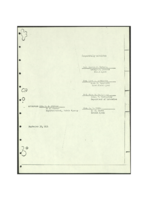
Reservations, allotments, and infrastructure improvements at the Las Vegas Paiute Colony: Paiute Agency correspondence
Date
Archival Collection
Description
Correspondence between E. A. Farrow and the Department of the Interior Office of Indian Affairs describing reservations under the jurisdiction of the Paiute Agency and discussing allotments of funds for infrastructure projects at the Las Vegas Paiute Colony.
Text
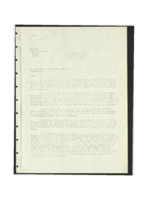
Allotments for infrastructure improvements: Paiute Agency letter
Date
Archival Collection
Description
Correspondence from E. A. Farrow, Superintendent of the Paiute Agency, to the Commissioner of Indian Affairs informing that existing construction plans are not possible with alloted funds. Includes a pencil drawn map of the plan for the rearrangement of the Las Vegas Paiute Colony.
Text
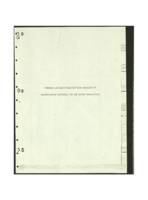
Paiute Agency jurisdiction information and correspondence
Date
Archival Collection
Description
Pages from "Findings and recommendations with reference to reorganization activities for the Paiute Jurisdiction" describe land status and classification at Goshute Reservation; Skull Valley Reservation; Shivwits Reservation; Kanosh Reservation; Paiute (Indian Peak) and Koosharem Reservation, followed by a summary of the Paiute tribes' voting on the Indian Reorganization Act. Correspondence between the Las Vegas Junior Chamber of Commerce and Paiute Agency Superintendent E. A. Farrow: Junior Chamber Secretary George W. Lange requests improvements to the Las Vegas Paiute Colony, including a gateway sign, to attract tourists. Farrow responds that funds are not available and the agency does not want to exploit the Paiute population.
Text
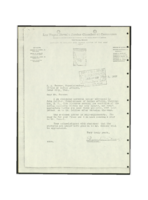
Las Vegas Paiute Colony: correspondence between the Las Vegas Junior Chamber of Commerce, the Paiute Agency superintendent, and the Commissioner of Indian Affairs
Date
Archival Collection
Description
Correspondence from Las Vegas Junior Chamber of Commerce President Frank McNamee Jr. to Commissioner of Indian Affairs John Collier documenting the conditions on the Las Vegas Paiute Colony. McNamee requests federal intervention. Correspondence from Superintendent E. A. Farrow to Commissioner Collier detailing Farrow's previous correspondence with the Las Vegas Junior Chamber of Commerce and his recommendations.
Text
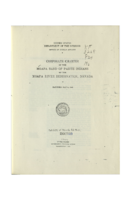
Corporate Charter of the Moapa Band of Paiute Indians of the Moapa River Reservation, Nevada
Date
Archival Collection
Description
Charter of incorporation of the Moapa Band of Paiute Indians of the Moapa River Reservation, Nevada under the June 18, 1934 Wheeler-Howard Act (Indian Reorganization Act). The charter encompases eleven (11) sections: Corporate Existence, Perpetual Succession, Membership, Management, Corporate Powers, Termination of Supervisory Powers, Corporate Property, Corporate Dividends, Corporate Accounts, Amendments, and Ratification.
Text
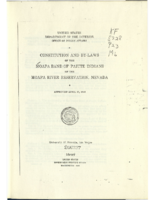
Constitution and by-laws of the Moapa Band of Paiute Indians of the Moapa River Reservation, Nevada
Date
Description
Constitution and by-laws of the Moapa Band of Paiute Indians of the Moapa River Reservation. The constitution includes eight (8) articles: Territory, Membership, Governing Body, Vacancies and Removal from Office, Powers of the Business Council, Bill of Rights, Land, and Amendments. The constitution by-laws include six (6) articles: Duties of Officers, Certificate of Election, Compensation of Council Members, Time and Place of Meetings, Installation of Officers and Council Members, and Ratification of Constitution and By-Laws.
Text
